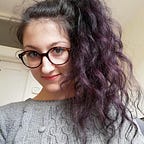Writing a YA novel for my MA in Creative Writing! (part 1)
This is the beginning of a series of updates (the written equivalents of ‘vlogs’, if you will) on the process of writing a YA novel for my MA in Creative Writing. I’d like this to be a weekly thing, ideally, but we’ll see how it goes.
Now this is not the first time I’m writing a novel, but it’s the first time I’m doing it for something as serious as an MA.
This novel will actually encompass my dissertation, which is 15,000 words long and is due by the 30th of September 2021. Yup, that’s soon.
I’ve been working on this new project for a few weeks now, and I would say it’s going pretty well. I mean I haven’t had any nervous breakdowns yet.
I’m in the process of editing the first chapter, which is 2,000 words long because of my MA requirements, and I need to hand it in by the 13th of May. Along with those 2,000 words, I need to write a ‘fake’ query letter to a literary agent and a synopsis, which are very useful exercises.
This YA novel is set in England in the 1880s, and it deals with important issues: racism, disability, mental health, the LGBTQ+ community.
Now this might seem like a desperate attempt to attract the attention of readers and publishers alike through the use of ‘trendy themes’, but I promise it’s not.
One of these issues is personal to me. The others aren’t, but I still want to include them because I’m tired of books (and shows/movies/games…) which pretend that these issues don’t exist, and that the world isn’t as complex as it really is.
I want to depict the truth, especially since this will be (hopefully) read by young people who are still figuring themselves out, and deserve to know the truth about the world and to relate to a bunch of realistic characters. Characters of colour, with different sexual orientations, body shapes, non-stereotypical personalities… Complex, diverse characters. As a writer, I feel it is one of my responsibilities.
Now this is a complicated matter, because I am a white cishet who truly has no idea of what it means to grow up as a person of colour in a predominantly-white society, and I have no idea what it’s like to be gay in a conservative family.
Of course, priority should be given to writers belonging to underrepresented communities; that’s the most important thing right now. They need to be heard and published more. But what can we, white cishet writers, do to contribute to a more diverse and equal literary world? Get educated.
I think we shouldn’t write only about characters who look like us, because that would make for very boring and unrealistic books. Also, if we only wrote about what we know, we wouldn’t be telling very interesting stories, would we?
I’m not interested in doing that. But before I go down that winding lane, I need to make sure I’m as little prejudiced as possible (because we’re all prejudiced to some degree, that’s just a fact). I need to make sure that I’m not creating stereotypical characters, even unconsciously.
For that purpose, I believe sensitivity readers, despite the controversy around them, are a good option. Along with doing a lot research. I don’t think you can be a white cishet writing about characters of colour and other cultures and communities, and not hire several people from these backgrounds to read your work and make sure you’re not saying anything offensive or downright false.
It’s okay (and human) to make mistakes; what’s not okay is not recognising them, and not being willing to learn and improve.
So I’ve used the Writing with Colour resources on Tumblr to learn how to depict characters of colour in a respectful way, and I’m planning on using the services of a professional sensitivity reader later on, once the manuscript is complete. I want to do this right.
What I’m struggling with the most right now, besides what I just talked about, is knowing where my story’s going. I think that’s because I’m writing this novel for my MA, and I have specific deadlines and requirements that are forcing me to write this story differently.
I didn’t have a lot of time to plan/outline the novel. I jumped straight into writing the first chapter, because it’s due very soon. Except it’s difficult knowing what to include in the first chapter of a novel when you don’t have the whole novel outlined…
That’s what I’m working on now, after having written the first draft of the first chapter and having had beta readers give me (invaluable) feedback on it. I can tell it’s unbalanced and clumsy, and it’s obvious I don’t exactly know where I’m going.
It’s getting better though; I’ve been using the synopsis to help me write a more detailed outline of the novel. I’m getting to know my main character. I’m beginning to understand what’s about to happen to him.
Also, I’ve been struggling with my style, my voice. For some reason I’m having difficulty making this first chapter sound like YA. I may have been reading too much middle-grade fiction lately, for inspiration. Working on an interactive story with a second-person POV for 6 months probably hasn’t helped either.
My narrative voice has to go from being stiff and impersonal, to being characterful and smooth. So I’m reading YA again, and also ‘The Writing Words: Writing Great Books for Children and Young Adults’ by Cheryl Klein. That’s helping a lot.
Btw, I went for a first-person POV in the present tense. Two things I’m unfamiliar with. I usually write in third-person limited in the past tense. But hey, it’s good to learn new things.
Let’s see where we’re at next week!
Originally published at https://ghostofastory.wixsite.com on April 28, 2021.
